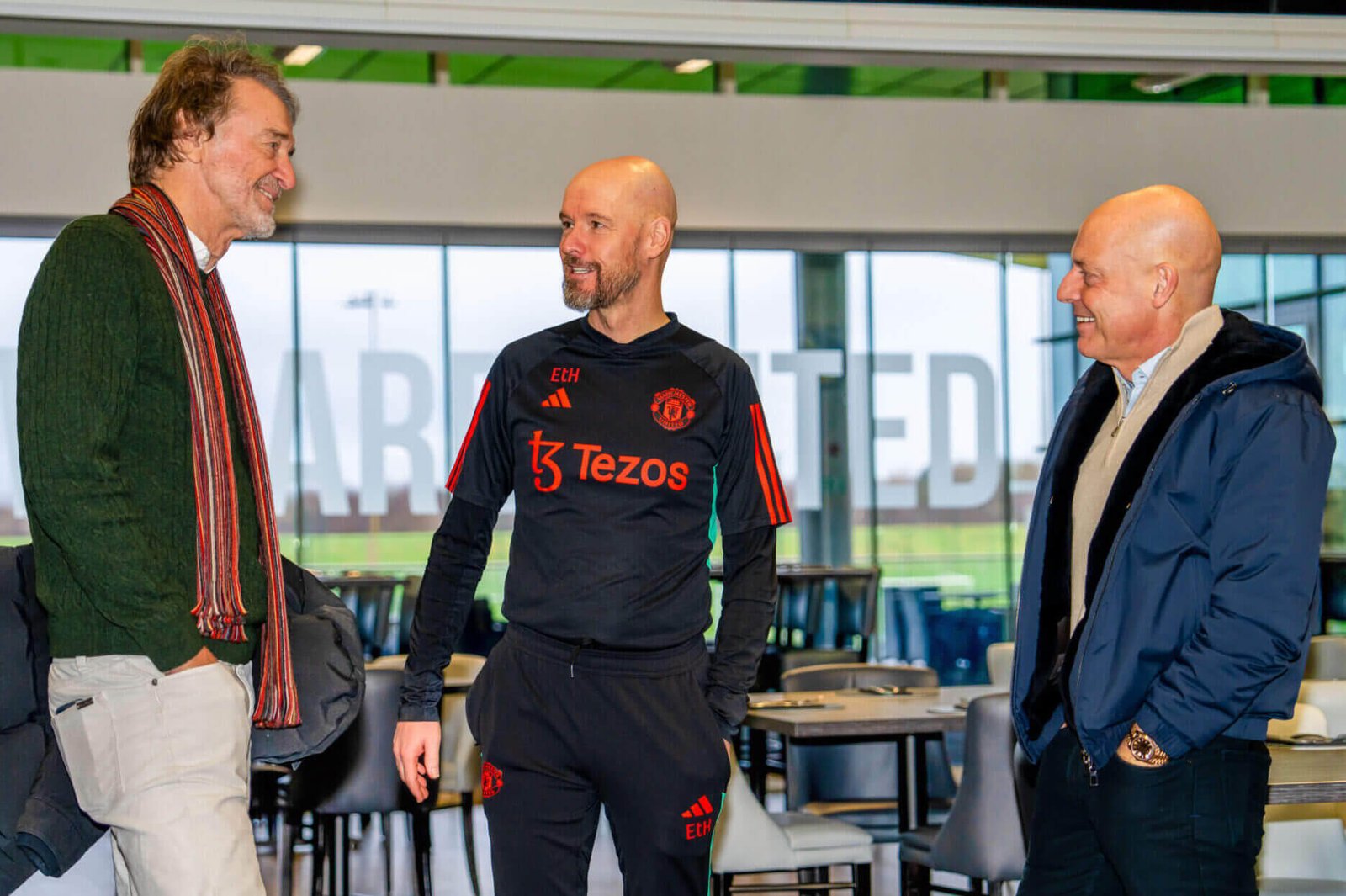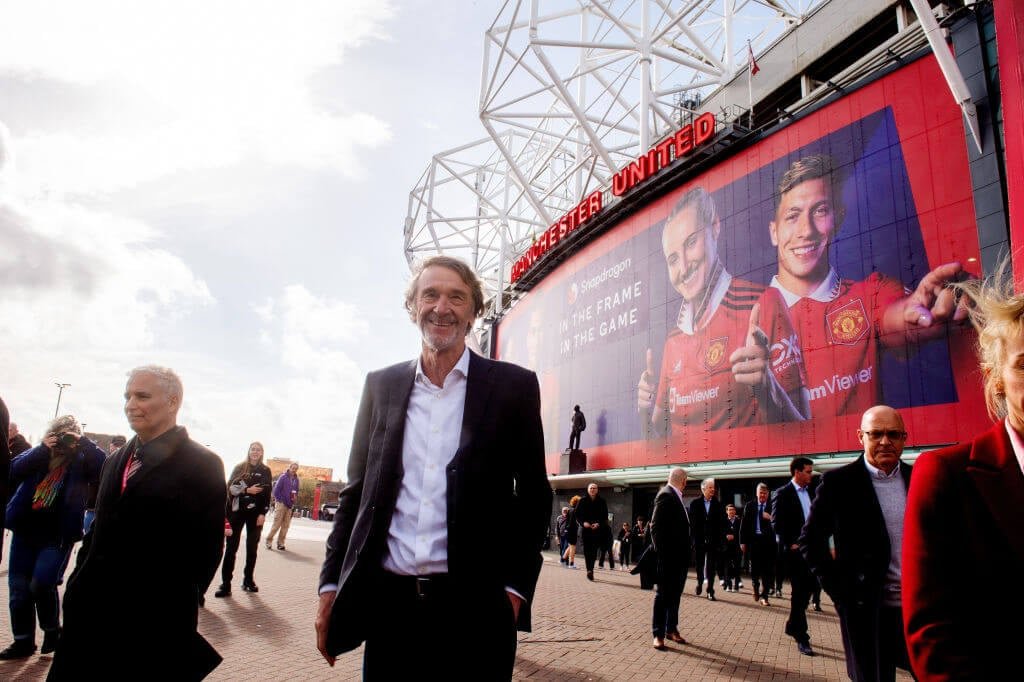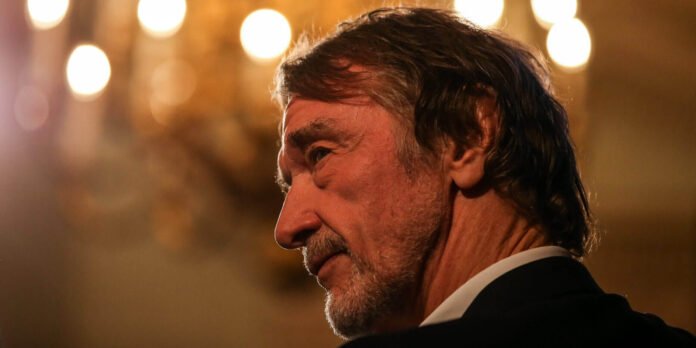In a boardroom suite at the London headquarters of petrochemicals firm INEOS, Sir Jim Ratcliffe finished his discussion of Manchester United’s future with a flourish. He transported his audience — 13 journalists from the British and international media — back to 1851 and the first edition of sailing’s America’s Cup.
“Queen Victoria was present,” he explained. “The U.S. sent a yacht across called America. We had 11 yachts and we had a race around the Isle of Wight. It was hosted by the Royal Yacht Squadron. In the end, the American boat won the race. Queen Victoria turned to the commodore and said ‘Did we come second?’ And the commodore said: ‘There is no second.”
In the circumstances, it was fitting analogy for the culture and mentality which Ratcliffe wishes to instil at Old Trafford, where, in the medium-term, he says only winning will suffice.
This week, Ratcliffe secured ratification of a 27.7 per cent minority shareholding of United, the team he says that he supported as a child. Ratcliffe is now 71 and a multi-billionaire. The entrance to his INEOS HQ is located opposite the Burberry entrance to Harrods, London’s luxury department store, and in the heart of opulent Knightsbridge. The first floor of the building pays homage to the strands of his business: miniature models of the 4×4 INEOS Grenadier car and references to INEOS’ adventures in sailing and marathon running.
This United process had been a marathon in its own right. Ratcliffe rolled his eyes and smiled when asked whether he ever contemplated walking away from a deal which took more than a year to complete. “How long have you got?” he asked. “Time and time again. I remember at the Monaco Grand Prix, which was in May, we opened a bottle of very expensive champagne and all celebrated. That was a false dawn and we went through several more false dawns after that.”
As he became more comfortable, Ratcliffe’s lips loosened, jesting about his rival bidder, the Qatari Sheikh Jassim, whose approach he described as a very odd affair.“Still nobody’s ever seen him, actually,” Ratcliffe laughed. “The Glazers never met him… he never… I’m not sure he exists!”
The audience with Ratcliffe provided a window into his thinking, ambition and, above all, his clarity. He set out his stall, stating that the “two most talked-about issues at Manchester United are number one, the football, the performance on the pitch, and the second one is the stadium.”
Manchester City, he said, have set the gold standard in recent years. He mentioned City over a dozen times during the hour, often in reverential tones. “We have a lot to learn from our noisy neighbour and the other neighbour (Liverpool). They are the enemy.”
He added: “There is nothing I would like better than to knock both of them off their perch” — echoing former United manager Sir Alex Ferguson’s infamous reference to his club’s rivalry with Liverpool in 2002, if without the accompanying expletive.
Ratcliffe said he did not really understand the circumstances of Manchester City being accused by the Premier League of 115 alleged breaches of its financial regulations (which City deny), preferring to focus on “smashing them on the field.”
He said things that will make United fans a little giddy. A three-year plan to restore them to the summit of English and European football. An upcoming 150th anniversary for the club in 2028, by which time success should be on the horizon. He wants United not only to win but to be playing the “best football in the world.”
Billion-pound proposals to refurbish United’s stadium, Old Trafford — “a bit run-down and neglected”, he said — or to construct a new one entirely. An affirmation of his commitment to the club’s academy and young players. How charmed he had been by the photograph of Kobbie Mainoo, Alejandro Garnacho and Rasmus Hojlund posing together by the Old Trafford advertising hoardings during a recent Premier League win over West Ham United. How he is listening to Sir Alex Ferguson. One meeting with United’s legendary manager had been scheduled to last an hour, but instead became a four-hour get-together at Ferguson’s home in January.
Ratcliffe enjoyed the photo of Hojlund, Garnacho and Mainoo (Photo: PAUL ELLIS/AFP via Getty Images)
Some of these pronouncements make instant headlines. They also set expectations and a yardstick against which his minority ownership will be measured.
While daring in his words, there was also realism. “It is not a light switch, where these things change overnight,” Ratcliffe warned. “And if we give people false expectations, then they will get disappointed.”
He said that United’s recent “history” of spending, where the club has often paid over the odds on transfer fees and wages, will impact their capacity for manoeuvre in the transfer market, as United seek to comply with Premier League and European financial regulations.
What followed, therefore, was a significant degree of common sense: “Don’t rush at it”, “populate all the key roles with people who are best in class, 10 out of 10s” and “create this environment which is driven and competitive”.
“It is going to be intense at times,” he said, “but equally it needs to have warmth and friendliness and be a supportive structure because the two things marry together well. They probably haven’t had that environment for the last 10 years. If we get those three things right, then you have to believe the results will follow.”
He emphasised United must be a football-first operation, which ran directly counter to the perception many have held of the Glazer family’s ownership in recent years. He said: “United (has been) a bit, I think, in the last 10 years, that if you’re really good in commercial and you make lots of money, then you’ll be successful in football because you’ve got lots of money to spend.
“But I think that’s flawed because it only starts for a certain while and you start to degrade the brand if you’re not careful. We’re really clear that football will drive the club. If we’re really successful at football, then commercial will follow. And we’ll make more money.”
As for the manager Erik Ten Hag, Ratcliffe was empathetic in his assessment, even if he stopped short of throwing his weight of support behind the Dutchman, who has endured a poor second season at Old Trafford. “I’m not going to comment on Erik ten Hag because it would be inappropriate to do that,” Ratcliffe said.
“But if you look at the 11 years that have gone since (former United chief executive) David Gill and Sir Alex Ferguson have stepped down, there have been a whole series of coaches, some of which were very good. And none of them were successful, or survived for very long. And you can’t blame all the coaches. The only conclusion you can draw is that the environment in which they were working, didn’t work.”
He did not lighten the load entirely from Ten Hag, warning that the club consider Champions League qualification a priority for this season. Many in the room nodded their heads as Ratcliffe explained that United must have a club-led style of play, to help avoid expensive bills and player churn when head coaches change. The new chief executive, Omar Berrada (poached from Manchester City), will work with INEOS to devise this, along with hires at sporting-director level and a head of recruitment.

Ratcliffe and INEOS’ sporting director Sir Dave Brailsford meet Ten Hag in January (Manchester United/Manchester United via Getty Images)
“We’re not going to oscillate from a (Jose) Mourinho style to a (Pep) Guardiola style,” Ratcliffe said.
Yet behind the rose-tinted vision, thornier questions remained. United do not yet have a sporting director and remain locked in a standoff with Newcastle United to extract Dan Ashworth, who has been placed on gardening leave. Ratcliffe was in a playful mood when The Athletic asked what he made of a reported £20million ($25.3m) asking price for Ashworth.
“A bit silly, personally,” he sighed. “I won’t get dragged into that.”
He then very much dragged himself into that. “What I do think is completely absurd is suggesting a man who is really good at his job sits in his garden for one and a half years,” he added. He praised City’s approach to Berrada, saying the clubs had a very “grown-up” conversation, which may have been a hint that he believes Newcastle ought to do the same.
Ratcliffe’s stadium ambitions, meanwhile, are an expensive concept. United are exploring all manner of funding arrangements. But here came a pitch that may be very popular with United fans but not altogether appreciated by rival supporters or the British taxpayer.
Ratcliffe argued that state support for United’s project would represent an “investment for the north.”
“The people in the north pay their taxes like the people in the south pay their taxes,” Ratcliffe insisted. “But where’s the national stadium for football? It’s in the south. Where’s the national stadium for rugby? It’s in the south. Where’s the national stadium for tennis? It’s in the south. Where’s the national concert stadium? It’s the O2 arena, it’s in the south. Where’s the Olympic Village? It’s in the south.
“Where is the stadium in the north? How many Champions League titles has the north west won and how many Champions Leagues has London won?
“The answer to that is the north west has won 10 and London (Chelsea) has won two. Where do you have to go if you get to the semi-final of the FA Cup and you’re a northern club? You have to schlep down to London, don’t you?
“People in the north pay their taxes and there is an argument you could think about a more ambitious project in the north which would be fitting for England, for the Champions League final or the FA Cup final and acted as a catalyst to regenerate southern Manchester, which has got quite significant history in the UK.”
The Athletic then asked whether Ratcliffe’s own status, as a resident of Monaco, may pose a challenge. Should a billionaire, who has relocated to a tax haven, see his club benefit from taxpayer money? Ratcliffe’s chummy demeanour briefly gave way.

Ratcliffe visits Old Trafford in March 2023 (Peter Byrne/PA Images via Getty Images)
Ratcliffe bristled: “I paid my taxes for 65 years in the UK. And then when I got to retirement age, I went down to enjoy a bit of sun. I don’t have a problem with that, I’m afraid.”
There was time yet for another unexpected twist. United’s forward Mason Greenwood is currently on loan at Spanish club Getafe, after United eventually concluded last summer that he should not resume his career at the club. He had been subject to an internal club investigation since last February when the UK’s Crown Prosecution Service (CPS) discontinued its case against him for attempted rape, assault, and coercive control. He denied all the alleged offences.
Many had considered the matter pretty much closed, particularly after United attempted to bring Greenwood back, only for a backlash against the plans to provoke a U-turn. In a staff meeting in September, chief executive Richard Arnold reassured concerned staff members Greenwood would not play again for United.
Yet Arnold is now gone and United’s football operation has a new boss. And Ratcliffe did not present Greenwood’s future as a shut case, albeit his words did not give away a clear preference. He said INEOS will make a fresh decision, which they will then justify.
Ratcliffe said: “The process will be: understand the facts not the hype and then try and come to a fair decision on the basis of values which is basically is he a good guy or not, and answer could he play sincerely for Manchester United well and would we be comfortable with it and would the fans be comfortable with it.”
Those comments will sharply divide opinion, particularly after the tensions of last summer, when charities, members of parliament, local councillors and supporters’ groups all expressed strong dissatisfaction with United’s plans to reintegrate Greenwood. Ratcliffe also noted United will have a decision to make on another loan player, which presumably meant Jadon Sancho, who is currently exiled at Borussia Dortmund.
More broadly, Ratcliffe recognises the challenge of redeeming United’s sporting operation. He was asked whether the experience of Chelsea’s new ownership, under Todd Boehly and Clearlake Capital, offers caution.
“What I would say is that, having bought other clubs in Lausanne (in Switzerland) and Nice (in France), we have made a lot of cock-ups. We’ve made some really stupid decisions in both those clubs. There are a lot of organisations in the world where, if you make a mistake, you get shot, so nobody ever puts their head above the parapet,” he said.
“But at INEOS, we don’t mind people making mistakes — but please don’t make it a second time. So with that, we’re much less than sympathetic when they make the same mistake twice. We have made mistakes in football, so I’m really pleased that we made those mistakes before we arrived here at Manchester United. If we hadn’t, this would be a much tougher job for us. Because it is huge and it’s very exposed.”
This whole event had, The Athletic suggested to Ratcliffe, been a rare and unusual event: a significant Manchester United shareholder actually talking about the club they run.
“I have a very simple view of a football club,” Ratcliffe said. “It’s a community asset. The club is owned by the fans. That’s what it’s there for: for the fans. We’re guardians or stewards for a temporary period of time. I’m not going to be there forever. It is important we communicate to the fanbase. We underestimate how important an aspect it is of their life and how it affects their life.
“On a wet Monday morning in Manchester, that’s the first thing you talk about when you go into the office or the factory: how did we do at the weekend? And you either start off with a good week or a bad week depending on how it went. It’s beholden upon us to… It’s not my job to do it on a frequent basis but it was quite important today that we are seen by the true owners, who are the fans, really.
He added: “It is biggest challenge in sport that we’ve undertaken. The club is enormous. Everywhere I go in the world, it’s Manchester United. It affects an awful lot of people on the planet, and getting it right is not easy.
“We’ve got to get so many aspects of that club right. And the right people doing the right thing at the right time and doing it well. It’s a very complex problem, football – which is surprising considering it’s just putting 11 players on a football field, and they run around. But it’s very complex getting there.”
(Top photo: Sir Jim Ratcliffe at the Royal Automobile Club, London, in December. Steven Paston/PA Images via Getty Images)
Read the full article here


